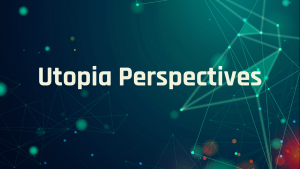I believe the definition of a utopia or a dystopia is in the eye of the beholder. Some will view anything less than complete freedom without consequences as a dystopia while others cannot view a world without complete safety as a utopia. A utopia of universal income for one is a dystopia for others that feel unrewarded. This is easy to see in Brave New World where the price for “happiness” is near universal drug use and damaging unborn infants (Huxley, 2010). I feel like a true utopia for all will never exist and Utopian Perspectives echos this with two perspectives (Dana the utopian one and Mary the dystopian) about the same world.
Technology has already and will continue to shape our world. Jaco Hamman quotes Melvin Kranzberg “Technology is neither good nor bad; nor is it neutral” and indicates that “digital literacy is an ethical project” (Bruff, 2019, 7:30). The first quote reinforces the second and stressing the importance of understanding the potential uses and influences of a given technology such as AI, machine learning, and algorithms (as discussed last module) and the need for users of this technology to engage an ethical framework when planning and using these technologies. Dana in the speculative narrative realizes that algorithms may have unintended consequences and require human supervision but does not fully understand her own role and impacts in her designed use of the employment algorithm. The speculative narrative also shows the gap in educational affordances based on socio-economic factors that is likely to remain in thirty years due to individualistic thinking by many who hold influence or power in the world.
References
Bruff, D. (Host). (2019, May 20). Future Of Digital Literacies Faculty Panel (60) [Audio podcast episode]. In Leading Lines. Vanderbilt Center for Teaching. https://leadinglinespod.com/episodes/episode-60future-of-digital-literacies-faculty-panel/
Huxley, A. (2010). Brave new world (11th ed.). Vintage.

Hi Jennifer,
I really enjoyed reading your narratives and how you portraited the life story of Dana and Mary in great details. It clearly shows how our future can be shaped by using algorithms to determine people’s major life events, such as career path and right to birth. This is also touched on in my speculative narratives and it seems like we both share a similar perspective on the detrimental impact that algorithms can have on human beings.
What I found really interesting is that people who do not meet the criteria are “assigned with special project abroad” and cut off from their families. I wonder what happens to them? Does it mean they are given up on? In my story, people are “fixed” through bioengineering and given a second chance, which may not be the best practice. I do believe that even the support for student with learning disabilities and special needs is lacking now, it will be resolved in the future with more advanced technology.
I also like the statement you made about the definition of utopia/dystopia is in the eye of the beholder. Therefore, I don’t think that a utopia for all is possible given everyone has their subjective definition. What we might achieve is an environment supplemented by technology that can tolerate and facilitate different possibilities.
I think I preferred what you did with your story and the bio-engineering rather than my “special project abroad.” There have definitely been some major advances using technology for communication for those who are non-verbal compared to fifty years ago so maybe you are right that technology supports will continue to improve, however I do see potential issues with bio-engineering and where that ethics line will lie.